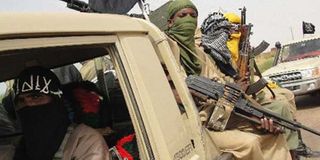Mali under threat as peace deal founders, fighting flares

This file photo taken at the Kidal Airport in northern Mali on August 7, 2012 shows fighters of the Islamic group Ansar Dine standing guard. AFP PHOTO
What you need to know:
- Last year, Mali's rebel alliance signed a peace deal along with government and loyalist militias.
- Jezequel said the peace accord was no more than an ineffective box-ticking exercise of unfulfilled promises.
BAMAKO
With Mali's hard-fought peace deal foundering and jihadist groups back on the offensive, the west African country could be headed for fresh chaos, experts say.
Malian, French and UN forces deployed to safeguard the country after a 2013 jihadist offensive in its vast arid north have increasingly come under attack this year.
Only last week, militants with the Al-Qaeda-linked group Ansar Dine briefly seized a town alarmingly close to the capital, Bamako, raiding a police station, bank and a prison.
Meanwhile, pro-government militia groups and former rebels who signed a 2015 peace deal are intermittently fighting each other in northern areas where the state remains absent.
"We're again, as we've been several times since 2013, at a defining moment," said International Crisis Group analyst Jean-Herve Jezequel, referring to France's 2013 military offensive against jihadist groups in northern Mali.
"On the political side things have improved, but it is very worrying security-wise," he said.
"The situation is a little confused."
In January 2013, French troops were deployed to repel Al-Qaeda-aligned jihadists who had overrun several northern towns, joining forces with Tuareg-led rebels.
Some 11,000 UN military and police followed, but the jihadists were never defeated — merely displaced.
Last year, Mali's rebel alliance signed a peace deal along with government and loyalist militias.
It was hoped that the deal would bring stability to the northern desert, cradle of several Tuareg uprisings and a sanctuary for Islamist fighters.
But since then, rival armed groups have repeatedly violated the ceasefire, threatening attempts to give the north a measure of autonomy to prevent separatist uprisings.
PATROLS
Jezequel said the peace accord was no more than an ineffective box-ticking exercise of unfulfilled promises.
Interim authorities for the restive north had been named but were not in place, he said, while promises of joint patrols between regular troops, pro-government militia and former rebels had not been delivered.
No one in Mali "really believes this peace deal can change anything significant," the analyst said, underlining that the accord was struck due to outside pressure rather than by a national consensus.
Former colonial master France has said openly it believes the government is not doing enough to reunite the country and bring back the separatist-leaning northern regions into the fold.
"I repeat regularly to President Ibrahim Boubacar Keita that the necessary initiatives must be taken to ensure the reintegration of the people of northern Mali into the community," French Defence Minister Jean-Yves Le Drian said last week.
The state is virtually absent in the north, and local elections due on November 20 in the rest of the country are not expected to take place in large swathes of the region.
A former member of the French security services told AFP on condition of anonymity that anyone who truly believed reconciliation with the north was possible "knows nothing about Mali".
Overlapping ties between jihadists and the armed groups active in the north — both former rebels and pro-government armed groups — also remain a stumbling block, experts believe.
Militia commanders "call on their jihadist allies", to sabotage aspects of the deal that displease them, said a security source working for the UN mission in Mali.
Elsewhere, Mali's bewildering array of jihadist organisations have morphed into nimble cross-border forces not plagued by the infighting that has dogged the groups that signed the peace deal, according to some observers.
Other experts have described a division of labour between jihadist organisations.
One example is jihadist group Al-Murabitoun, which has a faction allied to Al-Qaeda, led by one-eyed Algerian kingpin Mokhtar Belmokhtar, while another pledged allegiance to Islamic State, led by his former deputy Adnan Abou Walid.
"Each one has taken his own route," said a senior figure in a pro-government armed group, who admits to previously having links with Islamist groups.





